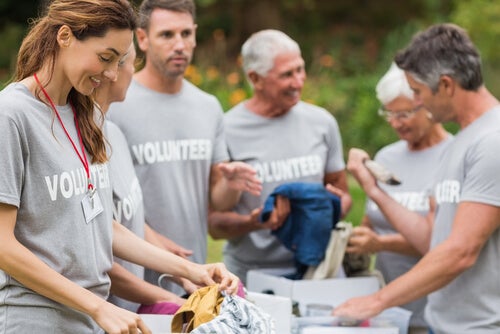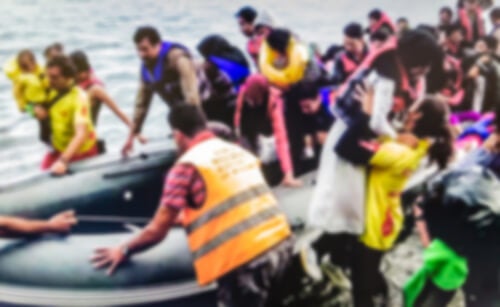The Importance of Volunteers in Crisis Situations

The role and importance of volunteers in today’s society has been gradually gaining weight. Freely taking on responsibilities and seeking to benefit a community is something that increasingly more people are taking on.
The importance of volunteers in a crisis
According to the International Federation of Red Cross and Red Crescent Movement (2011), more than 13 million volunteers collaborate with the International Red Cross and Red Crescent Movements. They provide services to vulnerable people without expecting anything financial or material in return.
However, there can sometimes be confusion between volunteers and professionals. Here’s how to differentiate between them:
- Volunteers, unlike contracted professionals, aren’t salaried employees.
- Volunteers don’t have to carry out the tasks of a professional. The role played by the volunteer, though important, shouldn’t be essential for the proper functioning of the organization.
- As it’s voluntary work, there shouldn’t be a contract that “obliges” the person to dedicate a certain amount of their time to the cause. Therefore, the time they devote to the work should be subject to the availability of the volunteer.
- The person doesn’t always need to have prior knowledge or experience in order to perform the designated work. However, it’s important to clarify that, in certain situations, it’s essential that volunteers have specific training. These occasions are usually crisis situations, emergencies, catastrophes, etc.
Therefore, there are certain specific differences between these two types of people. Likewise, groups of professionals are often trained to specifically intervene in emergency and disaster situations. Nevertheless, we still want to look at what concerns us today regarding volunteer work in crisis situations, emergencies, or similar events.
“There’s nothing stronger than the heart of a volunteer.”
-Jimmy Doolittle-

The role of volunteers in crisis situations
Unfortunately, we’re used to seeing different types of crisis situations. Almost on a daily basis, some part of the world is shaken by an emergency situation, a crisis, or a disaster that leaves hundreds of people affected. From tsunamis, to earthquakes, to terrorist attacks, as well as all sorts of natural catastrophes.
Therefore, in all these situations, the importance of volunteers is clear; they play a fundamental role. Thanks to them, normality is restored much more quickly. As each local corporation, depending on the specific place, has its territorial emergency plan, we wanted to compile the most important functions.
Some of these functions are:
- Support to professional emergency services in terms of prevention and organization.
- Collaboration in tasks of elaboration, dissemination, maintenance, and also the implementation of civil protection plans and self-protection plans.
- In the absence of professional emergency services, or when there’s a very long response time, they may eventually intervene in the event of accidents or disasters.
Coordination
However, this work will always be in coordination with, and with the prior knowledge of, the corresponding Emergency Coordination Center. Their intervention could consist of the following activities:
- Collaborating in the care of those affected by emergencies. Evacuation, shelter, supplies, etc.
- Assessment of the situations of need that can occur in any given emergency.
- Emotional support and containment tasks. Social emergencies are potential sources of stress.
- Psychosocial support is important in dealing with the consequences and also re-establishing normality.
- Information and counseling for those affected.
- Formation of self-help groups to overcome the situation.

It must be taken into account that any protocols established will change, and will do so not only depending on the place of the emergency, but also on the situation that has arisen.
It’s good to remember that, if you’re a volunteer and find yourself in a situation of this magnitude, you need to follow the instructions of the professionals in charge. A responsible person should always be in charge of distributing and organizing the tasks of each volunteer or group of volunteers.
The role and importance of volunteers in today’s society has been gradually gaining weight. Freely taking on responsibilities and seeking to benefit a community is something that increasingly more people are taking on.
The importance of volunteers in a crisis
According to the International Federation of Red Cross and Red Crescent Movement (2011), more than 13 million volunteers collaborate with the International Red Cross and Red Crescent Movements. They provide services to vulnerable people without expecting anything financial or material in return.
However, there can sometimes be confusion between volunteers and professionals. Here’s how to differentiate between them:
- Volunteers, unlike contracted professionals, aren’t salaried employees.
- Volunteers don’t have to carry out the tasks of a professional. The role played by the volunteer, though important, shouldn’t be essential for the proper functioning of the organization.
- As it’s voluntary work, there shouldn’t be a contract that “obliges” the person to dedicate a certain amount of their time to the cause. Therefore, the time they devote to the work should be subject to the availability of the volunteer.
- The person doesn’t always need to have prior knowledge or experience in order to perform the designated work. However, it’s important to clarify that, in certain situations, it’s essential that volunteers have specific training. These occasions are usually crisis situations, emergencies, catastrophes, etc.
Therefore, there are certain specific differences between these two types of people. Likewise, groups of professionals are often trained to specifically intervene in emergency and disaster situations. Nevertheless, we still want to look at what concerns us today regarding volunteer work in crisis situations, emergencies, or similar events.
“There’s nothing stronger than the heart of a volunteer.”
-Jimmy Doolittle-

The role of volunteers in crisis situations
Unfortunately, we’re used to seeing different types of crisis situations. Almost on a daily basis, some part of the world is shaken by an emergency situation, a crisis, or a disaster that leaves hundreds of people affected. From tsunamis, to earthquakes, to terrorist attacks, as well as all sorts of natural catastrophes.
Therefore, in all these situations, the importance of volunteers is clear; they play a fundamental role. Thanks to them, normality is restored much more quickly. As each local corporation, depending on the specific place, has its territorial emergency plan, we wanted to compile the most important functions.
Some of these functions are:
- Support to professional emergency services in terms of prevention and organization.
- Collaboration in tasks of elaboration, dissemination, maintenance, and also the implementation of civil protection plans and self-protection plans.
- In the absence of professional emergency services, or when there’s a very long response time, they may eventually intervene in the event of accidents or disasters.
Coordination
However, this work will always be in coordination with, and with the prior knowledge of, the corresponding Emergency Coordination Center. Their intervention could consist of the following activities:
- Collaborating in the care of those affected by emergencies. Evacuation, shelter, supplies, etc.
- Assessment of the situations of need that can occur in any given emergency.
- Emotional support and containment tasks. Social emergencies are potential sources of stress.
- Psychosocial support is important in dealing with the consequences and also re-establishing normality.
- Information and counseling for those affected.
- Formation of self-help groups to overcome the situation.

It must be taken into account that any protocols established will change, and will do so not only depending on the place of the emergency, but also on the situation that has arisen.
It’s good to remember that, if you’re a volunteer and find yourself in a situation of this magnitude, you need to follow the instructions of the professionals in charge. A responsible person should always be in charge of distributing and organizing the tasks of each volunteer or group of volunteers.
All cited sources were thoroughly reviewed by our team to ensure their quality, reliability, currency, and validity. The bibliography of this article was considered reliable and of academic or scientific accuracy.
- Arciniega, J. D. D. U. (2010). La resiliencia comunitaria en situaciones catastróficas y de emergencia. International Journal of Developmental and Educational Psychology, 1(1), 687-693.
- Bermejo, A. (2002). Manual de gestión del voluntariado. Ministerio de Trabajo y Asuntos Sociales.
- Colegio Oficial de Trabajo Social de Castilla-La Mancha. (Sf). Programa de Voluntariado e Intervención Social en Situaciones de Crisis, Emergencias y Catástrofes en Castilla La Mancha.
- Dávila de León, M. C., & Chacón Fuertes, F. (2004). Factores psicosociales y tipo de voluntariado. Psicothema, 16(4).
- Federación Internacional de Sociedades de la Cruz Roja y de la Media Luna Roja (2011). Proteger. Promover. Reconocer. El voluntariado en emergencias. Ginebra.
- Soidán, P. G., Poceiro, H. D., López, R. V., & López, Ó. R. (2010). La participación voluntaria en situaciones de emergencia. Papers. Revista de Sociologia, 95(4), 1157-1172.
This text is provided for informational purposes only and does not replace consultation with a professional. If in doubt, consult your specialist.







